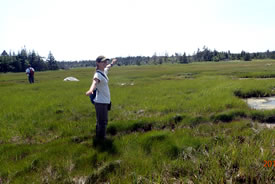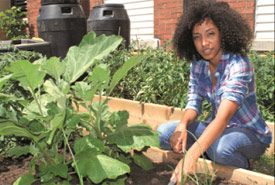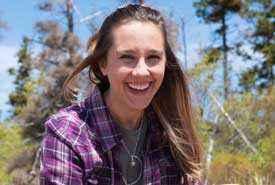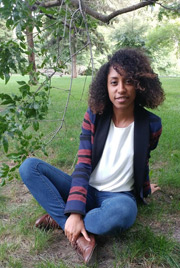Supporting the next generation of female conservationists

Danielle Horne in the field (Photo by NCC)
As with many university graduates, the hunt for work in my field of study began right after graduation. Finding meaningful employment can be hard for youth today, and at the time it was a difficult journey for me, too. I was fortunate to be hired for a few great contract positions in evolutionary ecology labs and environmental education, but what really made a difference for me was an internship position in New York at the Clinton Global Initiative in Environmental Stewardship. This experience provided me with a host of new skills and a robust network that I needed to help me transition into the workplace.

Volunteering at a local community garden (Photo by Micheline Khan)
The Nature Conservancy of Canada (NCC) is committed to training the next generation of conservation leaders. For more than a decade, NCC has employed talented post-secondary students in paid internships to assist with conservation and land stewardship work across Canada.
Imperial supported NCC by pledging $1 million dollars over four years to support the Conservation Internship program, enabling the completion of critical conservation work coast to coast. This year, all 10 interns hired under the Imperial-funded program are women!
This is an incredible achievement for NCC, as women in STEM (science, technology, engineering, mathematics) fields are under-represented. According to the Council of Canadian Academies, in 2011, only 27 per cent of female graduates with a STEM degree were working in their field in Canada.

Millie Kuyer (Photo courtesy NCC)
I recently interviewed some of our interns across the country to get their perspective on the importance of women in science careers.
Millie Kuyer is NCC’s conservation technician intern in British Columbia and has worked primarily in reforestation as a seasonal tree planter or foreperson.
“It’s as important for women to be in science careers as it is for men. We’re just in the process of levelling the playing field,” says Millie. “I feel fortunate to be living in a time and place that emphasizes the importance of equal opportunities in the workplace.”

Leigh Gustafson (Photo by Sean Landsman)
Representation is essential. Having more role models for young women to look up to, such as women in senior positions, is crucial in making science careers more attractive to young women.
“Only good things come from working together. It‘s essential that younger generations have female role models to admire. I’m completing my honours research this summer and in one of our meetings I looked around the room to realize that my entire team is composed of women. It’s rare to have a predominately female team and it was definitely a proud girl-power moment,” says Leigh Gustafson, NCC’s conservation intern in Prince Edward Island.
Leigh stumbled into the world of conservation and knew instantly that this is where she was meant to be. One of Leigh’s biggest role models is Jane Goodall. Her career goal is to work on the protection of habitats and sustainable practices with surrounding communities.

Kristen Glass (Photo courtesy Kristen Glass)
For NCC’s conservation technician intern for Eastern Ontario, Kristen Glass, her love for nature began in her childhood growing up in the country, north of Barrie, Ontario. Her career inspiration grew from reading National Geographic stories about conservation efforts and environmental issues.
“Women have a huge role to play in environmental science and conservation work! We have the ability to come up with great innovations and methods for conservation,” says Kristen.
NCC’s commitment to training and sustaining the next generation of environmental leaders is critical to our conservation efforts, now and into the future.


